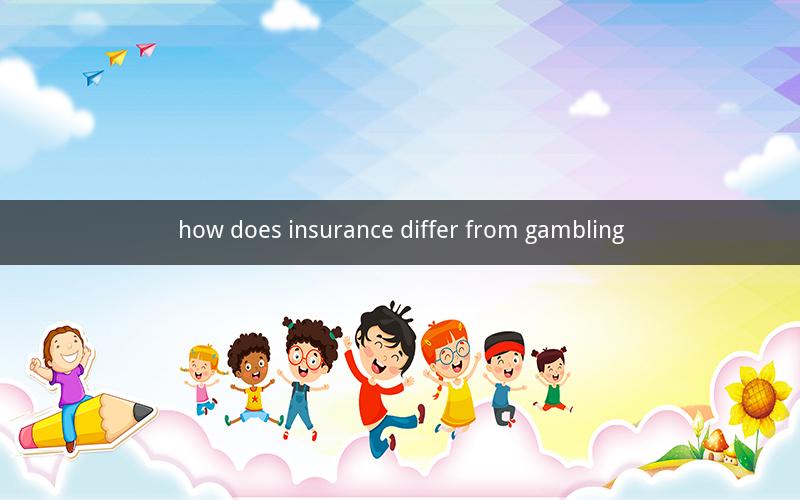
How Insurance Differs from Gambling
Table of Contents
1. Understanding the Basics
2. Purpose and Function
3. Risk Sharing and Transfer
4. Premiums and Wagering
5. Contracts and Odds
6. Legal and Ethical Considerations
7. Financial Stability
8. Risk Management
9. Long-Term Viability
10. Consumer Protection
1. Understanding the Basics
Insurance and gambling are both forms of risk management, but they operate on different principles. Insurance is a contract between an individual or entity (the insured) and an insurance company, which agrees to provide financial protection in exchange for regular payments known as premiums. On the other hand, gambling involves betting money or something of value on an event with an uncertain outcome, with the hope of winning a prize.
2. Purpose and Function
Insurance serves a specific purpose: to provide financial security in the event of a loss. It helps individuals and businesses manage risks by transferring the potential financial burden to an insurance company. In contrast, gambling's primary purpose is entertainment, with the goal of winning money or other prizes.
3. Risk Sharing and Transfer
Insurance operates on the principle of risk sharing. The insurance company collects premiums from many policyholders and uses the funds to pay out claims to those who suffer a loss. In gambling, risk is transferred from the bettor to the gambling establishment, which takes on the financial responsibility if the bettor wins.
4. Premiums and Wagering
Insurance premiums are calculated based on factors such as age, health, and the type of coverage required. They are intended to cover the expected costs of claims, administrative expenses, and profit for the insurance company. In gambling, wagers are placed based on odds, which represent the likelihood of an event occurring. The amount of the wager is typically determined by the individual's risk tolerance and budget.
5. Contracts and Odds
Insurance policies are legally binding contracts that outline the terms and conditions of coverage. They are designed to be fair and transparent, with clear definitions of coverage, exclusions, and limitations. In gambling, odds are often presented in the form of fractions, percentages, or decimal numbers. These odds reflect the probability of an event occurring and are used to calculate potential winnings.
6. Legal and Ethical Considerations
Insurance companies are subject to regulatory oversight to ensure compliance with laws and regulations. They must adhere to standards of good faith and fair dealing, and their practices are designed to protect consumers. Gambling, on the other hand, is often subject to regulations that aim to prevent fraud, money laundering, and underage gambling.
7. Financial Stability
Insurance companies must maintain a strong financial position to ensure they can meet their obligations to policyholders. They invest premiums in a diversified portfolio to generate revenue and cover claims. In gambling, the financial stability of the establishment is typically not a concern, as the primary focus is on providing an entertaining experience for customers.
8. Risk Management
Insurance companies employ actuarial science to assess and manage risks. They use data and statistical analysis to determine appropriate premiums and coverage limits. In gambling, risk management is less of a concern, as the focus is on the entertainment value and the potential for winning.
9. Long-Term Viability
Insurance is a long-term commitment, with premiums paid over an extended period. This allows insurance companies to provide continuous coverage and build a stable financial foundation. In gambling, the focus is on short-term gains, with little emphasis on long-term viability.
10. Consumer Protection
Insurance companies are regulated to protect consumers from unfair practices and fraud. They are required to provide clear information about coverage, exclusions, and limitations. In gambling, consumer protection measures vary by jurisdiction, but they generally aim to prevent fraud, underage gambling, and problem gambling.
FAQs
1. What is the main difference between insurance and gambling?
Insurance is designed to provide financial protection, while gambling is for entertainment.
2. Can insurance be considered a form of gambling?
No, insurance is not considered gambling because it involves a contract between the insured and the insurance company.
3. Are insurance premiums and gambling wagers calculated the same way?
No, insurance premiums are calculated based on risk factors, while gambling wagers are based on odds and individual preference.
4. How does an insurance company determine the risk of a policyholder?
Insurance companies use actuarial science and data analysis to determine the risk of a policyholder.
5. Can a person lose money on insurance?
Yes, if a policyholder cancels their policy, they may lose the amount of premiums they have paid.
6. What are the potential risks of gambling?
Gambling can lead to financial loss, addiction, and other negative consequences.
7. How does the legal framework differ between insurance and gambling?
Insurance is subject to strict regulations, while gambling laws vary by jurisdiction.
8. Can insurance cover gambling losses?
No, insurance policies typically exclude losses incurred through gambling.
9. Why do insurance companies invest premiums?
Insurance companies invest premiums to generate revenue and cover the costs of claims and administrative expenses.
10. How can a person manage their risks when gambling?
A person can manage their risks by setting a budget, understanding the odds, and seeking help if they develop a gambling problem.
By understanding the fundamental differences between insurance and gambling, individuals and businesses can make informed decisions about their risk management strategies. Insurance provides financial protection, while gambling is an entertainment activity with potential risks.